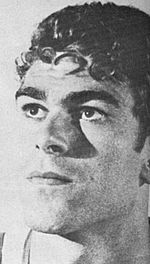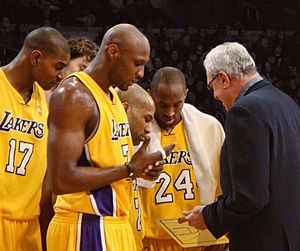Phil Jackson facts for kids
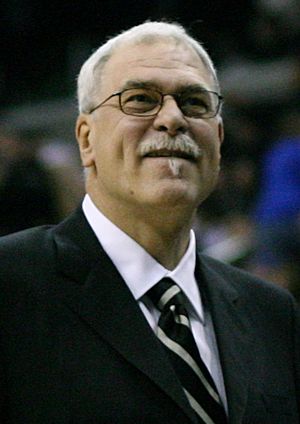
Jackson in 2009
|
|
| Personal information | |
|---|---|
| Born | September 17, 1945 Deer Lodge, Montana, U.S. |
| High school | Williston (Williston, North Dakota) |
| Listed height | 6 ft 8 in (2.03 m) |
| Listed weight | 220 lb (100 kg) |
| Career information | |
| College | North Dakota (1964–1967) |
| NBA Draft | 1967 / Round: 2 / Pick: 17th overall |
| Selected by the New York Knicks | |
| Pro career | 1967–1980 |
| Coaching career | 1978–2011 |
| Career history | |
| As player: | |
| 1967–1978 | New York Knicks |
| 1978–1980 | New Jersey Nets |
| As coach: | |
| 1978–1981 | New Jersey Nets (assistant) |
| 1982–1987 | Albany Patroons |
| 1984 | Piratas de Quebradillas |
| 1984–1986 | Gallitos de Isabela |
| 1987 | Piratas de Quebradillas |
| 1987–1989 | Chicago Bulls (assistant) |
| 1989–1998 | Chicago Bulls |
| 1999–2004, 2005–2011 |
Los Angeles Lakers |
| Career highlights and awards | |
As player:
As head coach:
|
|
| Career NBA statistics | |
| Points | 5,428 (6.7 ppg) |
| Rebounds | 3,454 (4.3 rpg) |
| Assists | 898 (1.1 apg) |
Philip Douglas Jackson (born September 17, 1945) is a famous American former basketball player, coach, and team executive. He is known for winning many championships in the National Basketball Association (NBA). Phil Jackson has won 13 NBA championships in total. He won two as a player and an amazing 11 as a head coach.
His 11 championships as a head coach are the most in NBA history. In 2007, Jackson was added to the Basketball Hall of Fame. He was also named one of the top 10 coaches in league history back in 1996. He holds many other records, including the most wins in the playoffs (229) and most conference titles (13).
Jackson played college basketball for the North Dakota Fighting Hawks. He was then chosen in the 1967 NBA draft by the New York Knicks. He won two NBA titles with the Knicks as a player. After playing for 13 seasons, he started coaching in other basketball leagues.
He later became an assistant coach for the Chicago Bulls in 1987. Jackson became the head coach of the Bulls in 1989. He helped the team win six championships. These wins happened in two "three-peat" streaks: 1991–1993 and 1996–1998.
In 1999, Jackson became the head coach of the Los Angeles Lakers. He led them to three championships in a row from 2000 to 2002. After a short break, he returned to the Lakers in 2005. He won two more championships with them in 2009 and 2010. He retired from coaching in 2011. From 2014 to 2017, he was the team president for the New York Knicks.
Jackson is famous for using the "triangle offense" strategy. He also used a special coaching style influenced by Eastern philosophy. This earned him the nickname "Zen Master". He wrote books about his teams and his basketball strategies.
Contents
Growing Up and Early Life
Phil Jackson was born in Deer Lodge, Montana, on September 17, 1945. His parents were church ministers. Phil and his two brothers grew up in a quiet area of Montana. Their home life was very simple. They were not allowed to dance or watch television. Phil did not see his first movie until he was a senior in high school. He went to a dance for the first time when he was in college.
Jackson went to high school in Williston, North Dakota. He played basketball there and helped his team win a state title. He also played football, was a pitcher in baseball, and threw the discus in track and field. His high school now has a sports complex named after him.
College Basketball Career
Phil Jackson was recruited to play basketball at the University of North Dakota. He played very well there. He helped the Fighting Sioux reach third and fourth place in the NCAA Division II tournament in 1965 and 1966.
Professional Playing Career
Playing for the New York Knicks (1967–1978)
In 1967, the New York Knicks drafted Jackson in the second round. He was a good athlete with long arms. He was not the best at scoring points, but he was smart and worked hard on defense. Jackson became a favorite with fans. He was a key substitute player for the Knicks. He helped the team win the NBA title in 1973. Jackson was injured during New York's 1969–70 championship season. He wrote a book called Take It All, which was a photo diary of the Knicks' 1970 championship run.
After the 1973 title, some main players retired. This gave Jackson a chance to become a starter.
Playing for the New Jersey Nets (1978–1980)
In 1978, Jackson moved to play for the New Jersey Nets. He played two seasons there. He retired as a player after the 1979–80 NBA season.
Coaching Career Highlights
Starting as a Coach (1982–1987)
After his playing career, Jackson coached in other professional leagues. These included the Continental Basketball Association (CBA) and a league in Puerto Rico. In the CBA, he won his first coaching championship in 1984 with the Albany Patroons. He was named the CBA Coach of the Year in 1985. He tried to get NBA coaching jobs, but was turned down.
Leading the Chicago Bulls (1987–1998)
In 1987, the Chicago Bulls hired Jackson as an assistant coach. He became the head coach in 1989. Around this time, he learned about the "triangle offense" from Tex Winter. Jackson became a big supporter of this strategy.
Over nine seasons, Jackson and the Bulls reached the playoffs every year. They won six championships. They won three championships in a row twice. These "three-peats" happened from 1991–1993 and 1996–1998.
After losing in the 1990 playoffs, Jackson convinced Michael Jordan to use the triangle offense. This helped the Bulls beat the Detroit Pistons in 1991. They then defeated the Los Angeles Lakers to win the NBA Finals. The Bulls won two more championships against the Portland Trail Blazers in 1992 and the Phoenix Suns in 1993. This first "three-peat" was the first since the Boston Celtics won eight titles in a row from 1959 to 1966.
Michael Jordan retired for a while after the 1992–1993 season. The Bulls still played well, but lost in the playoffs in 1994 and 1995. For the 1995-96 season, the Bulls had Jordan, Scottie Pippen, and Dennis Rodman. They set a record with 72 wins and only 10 losses in the regular season. They then won their fourth title against the Seattle SuperSonics. The Bulls won their fifth and sixth titles against the Utah Jazz in 1997 and 1998. After the Bulls' last title with Jordan in 1998, Jackson left the team.
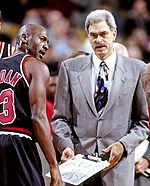
Coaching the Los Angeles Lakers (1999–2011)
After taking a year off, Jackson decided to coach again. He joined the Los Angeles Lakers in 1999. He quickly brought success to the team, just like he did with the Bulls. In his first year, the Lakers had a great record of 67 wins and 15 losses. They went on to win the 2000 NBA championship.
With superstar players Shaquille O'Neal and Kobe Bryant, Jackson led the Lakers to two more titles in 2001 and 2002. This was his third "three-peat" as a head coach. However, injuries and disagreements between Bryant and O'Neal caused problems for the team. They lost in the 2003 playoffs.
Jackson and Bryant often had disagreements. Bryant sometimes did not follow Jackson's "triangle offense." Despite these issues, the Lakers added star players Karl Malone and Gary Payton for the 2003–04 season. They reached the 2004 NBA Finals but were defeated by the Detroit Pistons. This was the first time Jackson lost in the NBA Finals as a head coach.
In June 2004, Jackson left the Lakers. Many thought it was because of the disagreements. Without Jackson and O'Neal, the Lakers struggled in the 2004–05 season.
In June 2005, the Lakers hired Jackson again. He led them back to the playoffs in 2006. He worked well with Kobe Bryant, who wanted Jackson back. On January 7, 2007, Jackson won his 900th game. He reached this milestone faster than any other coach.
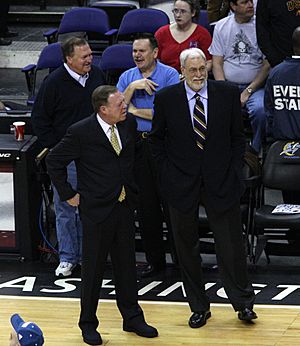
In the 2007–08 season, the Lakers got Pau Gasol. With another star player, Jackson coached the Lakers to the 2008 NBA Finals. They lost to the Boston Celtics. This was only the second time Jackson lost in the NBA Finals.
On December 25, 2008, Jackson won his 1,000th game. He was the fastest coach to reach 1,000 wins. Jackson led the Lakers to the NBA Finals again in 2009. They defeated the Orlando Magic to win Jackson's 10th NBA championship as a head coach. This broke the record for most championships won by a head coach.
On February 3, 2010, Jackson became the most successful coach in Lakers history with his 534th win. The Lakers reached the playoffs again in 2010. They defeated the Boston Celtics in the 2010 NBA Finals. This earned Jackson his 11th NBA championship as a head coach and his fifth with the Lakers.
Jackson returned to coach the Lakers for the 2010–11 season, saying it would be his last. He retired after the Lakers lost in the playoffs in 2011.
Executive Career
Working for the New York Knicks (2014–2017)
In 2014, Jackson became the president of the New York Knicks. He signed a five-year contract. On April 21, 2014, he fired the team's coach and staff. On June 9, 2014, the Knicks hired Derek Fisher as their new head coach. Fisher had played for Jackson with the Lakers and won championships with him.
Jackson made some trades and draft picks for the Knicks. The team had a tough season in 2014–15, setting a record for the most losses in franchise history. In 2015, the Knicks drafted Kristaps Porziņģis, who became a promising young player.
On June 28, 2017, the Knicks and Jackson decided to part ways. He was replaced by Steve Mills.
Awards and Recognition
Jackson won the 1996 NBA Coach of the Year Award. In the same year, he was named one of the ten greatest NBA coaches of all time. At that time, he had the highest winning percentage of any coach on that list. He still holds the highest winning percentage for coaches with 500 or more games coached.
In 2002 and 2010, the United States Sports Academy gave Jackson the Amos Alonzo Stagg Coaching Award. He also received the North Dakota's Roughrider Award.
Personal Life
Phil Jackson has five children and eight grandchildren. He was married twice. He married Maxine in 1967, and they divorced in 1972. He married June in 1974, and they divorced in 2000. He was engaged to Jeanie Buss, the daughter of Lakers owner Jerry Buss, but they ended their engagement in 2016.
He has studied psychology. In 2011, Jackson was diagnosed with prostate cancer. He decided to have surgery after the playoffs that year.
In 2020, he was featured in the documentary miniseries The Last Dance. This series was about the Chicago Bulls team of the 1990s. Jackson has mentioned that he no longer watches the NBA because he feels it has changed too much.
Career statistics
Playing
| Legend | |||||
|---|---|---|---|---|---|
| GP | Games played | GS | Games started | MPG | Minutes per game |
| FG% | Field goal percentage | 3P% | 3-point field goal percentage | FT% | Free throw percentage |
| RPG | Rebounds per game | APG | Assists per game | SPG | Steals per game |
| BPG | Blocks per game | PPG | Points per game | Bold | Career high |
NBA
Source
Regular season
| Year | Team | GP | GS | MPG | FG% | 3P% | FT% | RPG | APG | SPG | BPG | PPG |
|---|---|---|---|---|---|---|---|---|---|---|---|---|
| 1967–68 | New York | 75 | 5 | 14.6 | .400 | – | .589 | 4.5 | .7 | – | – | 6.2 |
| 1968–69 | New York | 47 | 4 | 19.7 | .429 | – | .672 | 5.2 | .9 | – | – | 7.1 |
| 1970–71 | New York | 71 | 7 | 10.8 | .449 | – | .714 | 3.4 | .4 | – | – | 4.7 |
| 1971–72 | New York | 80 | 6 | 15.9 | .440 | – | .732 | 4.1 | .9 | – | – | 7.2 |
| 1972–73† | New York | 80 | 4 | 17.4 | .443 | – | .790 | 4.3 | 1.2 | – | – | 8.1 |
| 1973–74 | New York | 82* | 21 | 25.0 | .477 | – | .776 | 5.8 | 1.6 | .5 | .8 | 11.1 |
| 1974–75 | New York | 78 | 61 | 29.3 | .455 | – | .763 | 7.7 | 1.7 | 1.1 | .7 | 10.8 |
| 1975–76 | New York | 80 | 3 | 18.3 | .478 | – | .733 | 4.3 | 1.3 | .5 | .3 | 6.0 |
| 1976–77 | New York | 76 | 2 | 13.6 | .440 | – | .718 | 3.0 | 1.1 | .4 | .2 | 3.4 |
| 1977–78 | New York | 63 | 0 | 10.4 | .478 | – | .768 | 1.7 | .7 | .5 | .4 | 2.4 |
| 1978–79 | New Jersey | 59 | 18.1 | .475 | – | .819 | 3.0 | 1.4 | .8 | .4 | 6.3 | |
| 1979–80 | New Jersey | 16 | 12.1 | .630 | .000 | .700 | 1.5 | .8 | .3 | .3 | 4.1 | |
| Career | 807 | 113 | 17.6 | .453 | .000 | .736 | 4.3 | 1.1 | .6 | .4 | 6.7 | |
Playoffs
| Year | Team | GP | GS | MPG | FG% | 3P% | FT% | RPG | APG | SPG | BPG | PPG |
|---|---|---|---|---|---|---|---|---|---|---|---|---|
| 1968 | New York | 6 | – | 15.0 | .286 | – | .800 | 4.2 | .3 | – | – | 4.0 |
| 1971 | New York | 5 | – | 6.0 | .286 | – | 1.000 | 2.0 | .4 | – | – | 1.8 |
| 1972 | New York | 16* | – | 20.0 | .475 | – | .737 | 5.1 | .9 | – | – | 9.8 |
| 1973† | New York | 17* | – | 19.9 | .500 | – | .737 | 4.2 | 1.4 | – | – | 8.7 |
| 1974 | New York | 12 | – | 24.8 | .466 | – | .900 | 4.8 | 1.3 | .8 | .4 | 11.3 |
| 1975 | New York | 3 | – | 26.0 | .476 | – | .875 | 8.3 | .7 | 1.3 | 1.0 | 9.0 |
| 1978 | New York | 6 | – | 8.3 | .500 | – | .667 | 1.7 | .5 | .5 | .0 | 2.0 |
| 1979 | New Jersey | 2 | – | 10.0 | .333 | – | 1.000 | 1.5 | .0 | .5 | .0 | 2.0 |
| Career | 67 | – | 18.3 | .458 | – | .782 | 4.2 | .9 | .8 | .3 | 7.7 | |
Head coaching record
Phil Jackson had a winning record every year as a head coach. He has the highest winning percentage of any Hall of Fame coach. He also has the highest winning percentage for any NBA coach who has coached 500 games or more. He holds the NBA record with 11 championships. He is the only coach to win at least 10 championships in any of North America's major professional sports.
At the end of the 2010 season, he had the fifth-most wins of any NBA coach. He was one of only six coaches to have over 1,000 wins. Of those six, he was the only one who had not coached over 1,900 games.
| * | Record |
| Regular season | G | Games coached | W | Games won | L | Games lost | W–L % | Win–loss % |
| Playoffs | PG | Playoff games | PW | Playoff wins | PL | Playoff losses | PW–L % | Playoff win–loss % |
| Team | Year | G | W | L | W–L% | Finish | PG | PW | PL | PW–L% | Result |
|---|---|---|---|---|---|---|---|---|---|---|---|
| Chicago | 1989–90 | 82 | 55 | 27 | .671 | 2nd in Central | 16 | 10 | 6 | .625 | Lost in Conf. Finals |
| Chicago | 1990–91 | 82 | 61 | 21 | .744 | 1st in Central | 17 | 15 | 2 | .882 | Won NBA Championship |
| Chicago | 1991–92 | 82 | 67 | 15 | .817 | 1st in Central | 22 | 15 | 7 | .682 | Won NBA Championship |
| Chicago | 1992–93 | 82 | 57 | 25 | .695 | 1st in Central | 19 | 15 | 4 | .789 | Won NBA Championship |
| Chicago | 1993–94 | 82 | 55 | 27 | .671 | 2nd in Central | 10 | 6 | 4 | .600 | Lost in Conf. Semifinals |
| Chicago | 1994–95 | 82 | 47 | 35 | .573 | 3rd in Central | 10 | 5 | 5 | .500 | Lost in Conf. Semifinals |
| Chicago | 1995–96 | 82 | 72 | 10 | .878 | 1st in Central | 18 | 15 | 3 | .833 | Won NBA Championship |
| Chicago | 1996–97 | 82 | 69 | 13 | .841 | 1st in Central | 19 | 15 | 4 | .789 | Won NBA Championship |
| Chicago | 1997–98 | 82 | 62 | 20 | .756 | 1st in Central | 21 | 15 | 6 | .714 | Won NBA Championship |
| L.A. Lakers | 1999–00 | 82 | 67 | 15 | .817 | 1st in Pacific | 23 | 15 | 8 | .652 | Won NBA Championship |
| L.A. Lakers | 2000–01 | 82 | 56 | 26 | .683 | 1st in Pacific | 16 | 15 | 1 | .938 | Won NBA Championship |
| L.A. Lakers | 2001–02 | 82 | 58 | 24 | .707 | 2nd in Pacific | 19 | 15 | 4 | .789 | Won NBA Championship |
| L.A. Lakers | 2002–03 | 82 | 50 | 32 | .610 | 2nd in Pacific | 12 | 6 | 6 | .500 | Lost in Conf. Semifinals |
| L.A. Lakers | 2003–04 | 82 | 56 | 26 | .683 | 1st in Pacific | 22 | 13 | 9 | .591 | Lost in NBA Finals |
| L.A. Lakers | 2005–06 | 82 | 45 | 37 | .549 | 3rd in Pacific | 7 | 3 | 4 | .429 | Lost in first round |
| L.A. Lakers | 2006–07 | 82 | 42 | 40 | .512 | 2nd in Pacific | 5 | 1 | 4 | .200 | Lost in first round |
| L.A. Lakers | 2007–08 | 82 | 57 | 25 | .695 | 1st in Pacific | 21 | 14 | 7 | .667 | Lost in NBA Finals |
| L.A. Lakers | 2008–09 | 82 | 65 | 17 | .793 | 1st in Pacific | 23 | 16 | 7 | .696 | Won NBA Championship |
| L.A. Lakers | 2009–10 | 82 | 57 | 25 | .695 | 1st in Pacific | 23 | 16 | 7 | .696 | Won NBA Championship |
| L.A. Lakers | 2010–11 | 82 | 57 | 25 | .695 | 1st in Pacific | 10 | 4 | 6 | .400 | Lost in Conf. Semifinals |
| Career | 1,640 | 1,155 | 485 | .704* | 333* | 229* | 104 | .688 |
See also
 In Spanish: Phil Jackson para niños
In Spanish: Phil Jackson para niños
- List of NBA championship head coaches
 | Chris Smalls |
 | Fred Hampton |
 | Ralph Abernathy |


